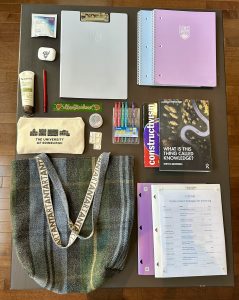Transcript of my story:
1 My oldest son who is 19 and going into his second year of University did not get into residence this meant that I needed to buy him a bed I ordered the bed second week of August and the earliest delivery date I could get that was on a weekend was Saturday September 16th so about a week before I got an email from Sleep Country where I had ordered the bed online
5 and it was asking to confirm the phone number address and the date I forwarded that email to my son and said read this in caps lock bold letters and then later that day I got another email that had a tracking number so I was a bit confused as to why there was a tracking number for a delivery that I had pre-selected the date the tracking number said that it wasn’t going to be delivered until Wednesday so I told my son heads up the bed might be coming a bit late and I
10 had so much going on with the start of teaching high school and the start of grad school that I just did not look into what I felt was weird about these emails then Saturday morning rolls around and I wake up early with this gut feeling that I’ve messed everything up so I go back into these emails look at them more clearly and realize that the second email with the tracking number was not from Sleep Country it was from sleep happy or something like that it was for
15 accessories for my husband’s CPAP machine so now I’m texting and phoning and FaceTiming my son all morning thinking he’ll have his ringer off and he’s going to miss the phone call from Sleep Country that is going to tell him the window that he will be getting his delivery so then at about 10:30 on Saturday morning the day of the delivery he my son finally calls me back text me back and I got him to check his phone and look at the missed calls and
20 he said the only missed calls he has are from me so now I’m worried that I gave them the wrong phone number so I go look at that original email and I find that he that I had put the wrong number I had one of my dyslexic episode where I switched to numbers around so I feel terrible But I’m also frustrated that my son didn’t read the email and didn’t notice the mistake that I had made when I originally placed the order anyways I call the customer service line for
25 Sleep Country give them the correct phone number they say they will contact the drivers and give them the correct phone number several hours go by where my son has still not heard from the drivers of Sleep Country and I’m now trying to arrange away for me to get to my son’s house house so that I can sit there and wait for the bed to arrive because he had since made plans when I told him that it wasn’t coming until Wednesday he made plans to go golfing with his
30 friends his new roommates or housemates I guess so 12:30 which is half an hour before I would have to leave to get to his house in time to let him get to golf on time I text and say have you heard anything from Sleep Country and he says yes they called and said they’d be here in 3 minutes so in the end the bed was delivered and thankfully I did not have to drive an hour to get to his house to let the bed people in it was a terrible day where I felt like I made so many
35 mistakes and there were so many opportunities for me to have noticed the mistakes but I was too busy and too overwhelmed to look closely at the details but thankfully everything worked out in the end and my son has a comfortable bed to sleep in instead of the air mattress that he had been sleeping in
How does the text deviate from conventions of written English?
- My voice to text story deviates significantly from the conventions of written English. First of all, there is no punctuation. The other most noticeable deviation from written English, are the vocal fillers that are generally not written; words such as: anyways, and so, and then. If I were to have written this story, I would have replaced those words to add interest.
What is “wrong” in the text? What is “right”? What are the most common “mistakes” in the text and why do you consider them “mistakes”?
- There were a few words that were transcribed incorrectly, but they were minor and didn’t change the meaning of the story. For example, on line 22 the word should be the number word two. Also, in line 27-28 the word house is repeated, I don’t think I repeated that word when I told the story orally.
- I was a little surprised to see that the computer knew that Sleep Country was a proper noun, and therefore capitalized the first letters of those words consistently. I was also surprised to see that it recognized what a “C-pap” was and wrote it as an acronym with all caps locked letters.
- The other thing it did right was spelling! I am a terrible speller, so it was surprising to not see any red underlined words in the transcript.
What if you had “scripted” the story? What difference might that have made?
- This was an excellent experience. It was a challenge to not dictate the punctuation. I felt vulnerable, not having a script to tell the story. If I had scripted it, I probably would have added time stamps and given a proper introduction to the situation. I would have told the story in a much clearer and sequential order.
In what ways does oral storytelling differ from written storytelling?
- Gnanadesikan (2011), points out that oral storytelling has been around since the beginning of humanity, where written storytelling was developed over time, as people found a need to record the things they couldn’t remember (p.4). All societies have oral language (or sign language) whereas there are still some remote societies today that do not have written language.
- The retelling of an oral story will change over time. In the recording of Walter Obe’s lecture he states that no oral story can be repeated verbatim (2:50). While there was still a high degree of confidence in the retelling of stories, because remembering them was valued in oral cultures, still each person who told the story would tell it a little bit differently.
- Oral story telling also “produces powerful and beautiful verbal performances of high artistic and human worth” (Ong, 2002). I can’t help but be reminded of Amanda Gorman’s poetic speech at Biden’s inauguration in 2021 (PBS). Reading this poem would not have produced the same powerful impact that came out of her reciting it orally. However, interestingly, three short months after she had recited her poem on live television, it had been published into a book. I’m sure there were capitalistic reasons for publishing the poem in writing; but I also think there was likely a desire to preserve the poem. People wanted to be able to refer to it, re-hear it, remember it, speak it to their own children. Drawing lines between what is oral and what is written is quite complicated these days, because while the poem was first presented to the public as an oral work of art; I am sure that Amanda Gorman would have composed it on paper with written word. Furthermore, I’m no poet, but I’m sure for poets, the composition of a poem is likely a combination of both saying the words out loud and then writing them down. This just goes to show how oral and written language are so entwined in the majority of humanity today.
References:
Aboud, A. (2014, September 8). Walter Ong – Oral Cultures and Early Writing [Video]. YouTube. https://www.youtube.com/watch?v=uvF30zFImuo&t=2s
Ong, W.J. (2002). Chapter 1: The orality of language.Links to an external site. In Orality and literacy: The technologizing of the word (pp. 5-16). Routledge. (Original work published 1982).
PBS News Hour. (2021, January 20). WATCH: Amanda Gorman reads inauguration poem, ‘The Hill We Climb’ [Video]. YouTube. https://www.youtube.com/watch?v=LZ055ilIiN4&t=27s



